Ready to unlock your body’s hidden potential for explosive strength and muscle growth?
Enter creatine – the most researched and proven supplement in the fitness world. While your body naturally produces this powerful compound, supplementation can take your athletic performance to heights you never thought possible. Whether you’re a seasoned athlete, weekend warrior, or just starting your fitness journey, understanding creatine could be the game-changer you’ve been searching for.
From boosting your energy during intense workouts to accelerating muscle growth and recovery, creatine’s benefits are backed by decades of scientific research. Let’s dive into the fascinating world of creatine supplementation and discover how this powerhouse molecule could revolutionize your fitness results!
Introduction to Creatine Supplementation
Creatine supplementation is a favorite among athletes and fitness buffs wanting to step up their game and see some serious muscle action. Knowing what creatine does and its perks can really help one decide if tossing it into their daily mix is the right move.
What is Creatine?
Creatine’s like a backstage hero – it’s a stuff your body already cooks up using amino acids, plus you can find some in meat and fish. Mostly, it hangs out in muscles, ready to roll when you’re lifting big or sprinting hard. In your muscles, creatine stores as phosphocreatine, which is kinda like a back-up power source that helps your cells re-up their ATP (adenosine triphosphate) – the stuff that keeps your body ticking.
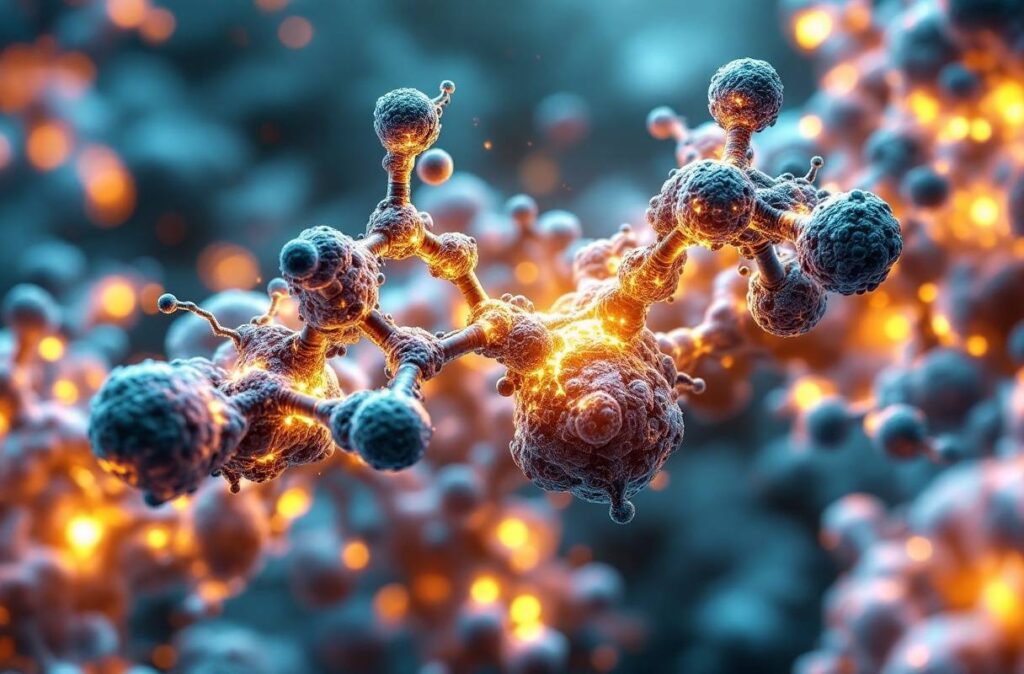
“Creatine is the most effective ergogenic aid currently available to athletes in terms of increasing high-intensity exercise capacity and muscle mass during training.”
Dr. Richard Kreider, Exercise & Sport Nutrition Lab Director
Benefits of Creatine Supplementation
Creatine isn’t just hype; there’s real juice here, especially if you’re into pushing yourself during intense workouts. Here’s what it can do for you:
- More Muscle Strength: Creatine gives you that extra oomph to lift heavier and keep going for more reps.
- Bigger Muscle Gains: Your muscles get extra energy, which means they’re likely to grow faster and fuller.
- Faster Recovery: Creatine helps you bounce back quicker between sets, so you can keep up the intensity.
- Performance Boost: If your sport’s about short, powerful bursts, creatine’s your buddy.
- Muscle Fullness: It also helps your muscles soak up more water, making them look bigger and feel stronger.
These benefits are why creatine is a go-to for bodybuilders, competitive athletes, weekend warriors, or anyone hitting the gym. Curious about stacking your supplements effectively? Check out our guide on supplement stacking for muscle gain.
| Benefit | What It Does |
|---|---|
| More Muscle Strength | Boosts strength and power |
| Bigger Muscle Gains | Helps grow muscle mass |
| Faster Recovery | Speeds up between-set recovery |
| Performance Boost | Aids in intense, short efforts |
| Muscle Fullness | Adds water to muscle cells |
Want to peek into other supplements? Check out our articles on best pre-workout supplements and post-workout recovery supplements to get the lowdown on what works best for you.
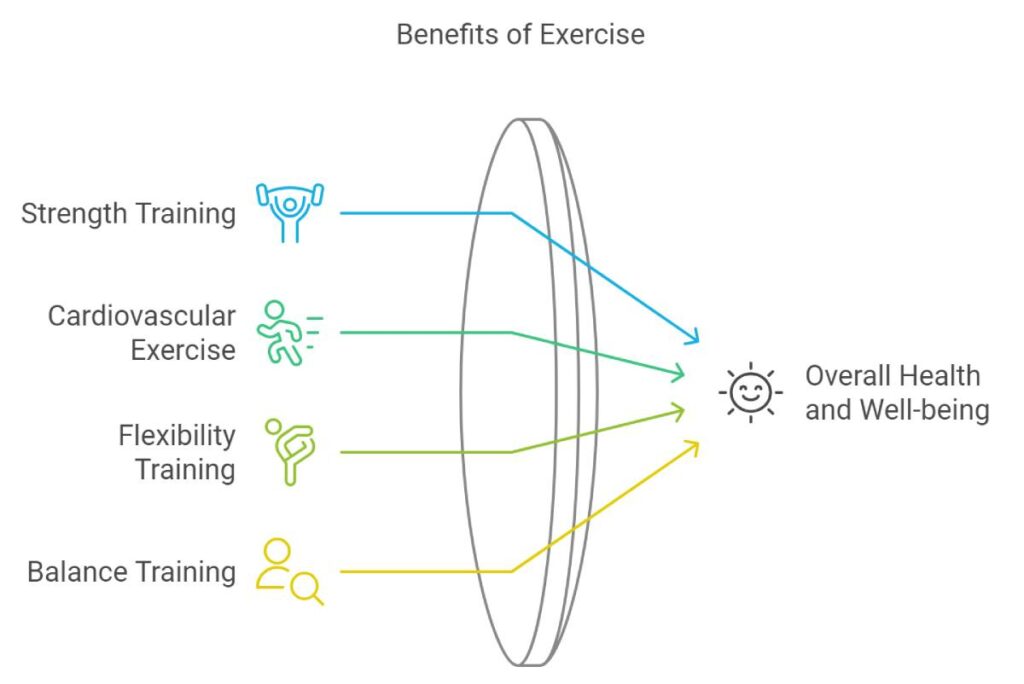
How Creatine Works
Creatine’s pretty awesome—it’s like the secret sauce for athletes and gym buffs wanting to crank up their gains. Let’s peek at what magic creatine brings to your workouts: it’s all about turbocharging energy and helping those muscles grow stronger.
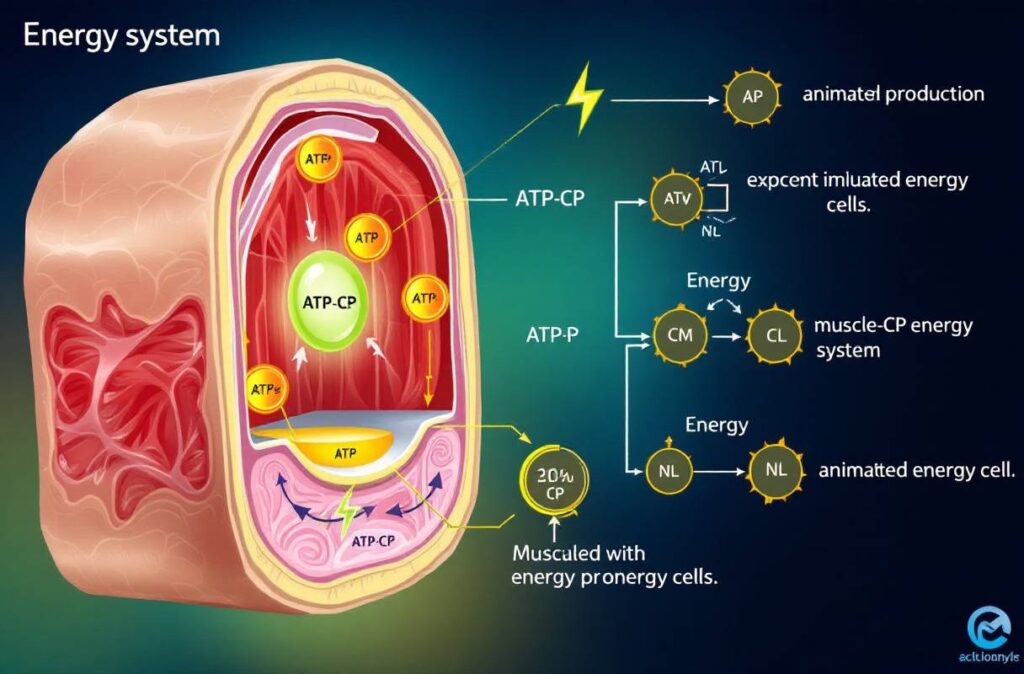
ATP Production and Energy System
So, ATP, or adenosine triphosphate if you’re feeling fancy, is the fuel in our cells’ engine. When you’re going full beast mode, say in weightlifting or sprinting, your muscles gobble up ATP faster than you can say, “Just one more rep.” This is where creatine steps in, helping to refill those ATP tanks, boosting your energy and keeping you from checking out early.
Once creatine gets into your muscles, it morphs into phosphocreatine. This superhero of a molecule gives a phosphate group a high five to ADP (adenosine diphosphate), bringing ATP back to life. Boom, you’ve got that quick energy return, making sprints, heavy lifts, and HIIT a breeze—or at least shorter bursts of power through the burn.
| Activity | Energy Source | Duration |
|---|---|---|
| Weightlifting | ATP-Phosphocreatine System | 10-15 seconds |
| Sprinting | ATP-Phosphocreatine System | 10-15 seconds |
| Long-Distance Running | Aerobic System | Several minutes to hours |
Muscle Growth and Strength Benefits
Creatine doesn’t just stop at fueling your energy. It bulks up your muscles, too. Sounds like a win-win, right? It pulls more water into muscle cells, and when those cells swell, they trigger muscle protein synthesis—think of it as your muscles’ way of flexing their new gains.
Plus, creatine gives you a helping hand with recovery. Intense exercises can cause tiny tears in muscle fibers (ouch), but creatine speeds up the mending. This means you can get back to doing what you do best: training harder and more often.
Bodybuilders and strength athletes aren’t shy about how much they love creatine. It’s literally pushing them toward bigger muscle and strength achievements. Also, need tips on mixing up your supplements? Pop over to our supplement stacking guide.
| Benefit | Mechanism | Outcome |
|---|---|---|
| Enhanced ATP Production | Increased Phosphocreatine | Improved Performance |
| Muscle Cell Volumization | Increased Water Content | Muscle Growth |
| Faster Recovery | Efficient Muscle Repair | More Frequent Training |
Knowing how creatine clicks with your muscles can help you tweak your supplements and push those gains even further. If you’re thinking about adding a bit of variety to your stack, maybe look into the glutamine benefits or beta-alanine perks for an all-around muscle boost.
Different Forms of Creatine
Got your eye on creatine supplements but feeling like a deer in the headlights with all the options? No worries! Let’s untangle the creatine web so you can beef up your fitness game like a pro.
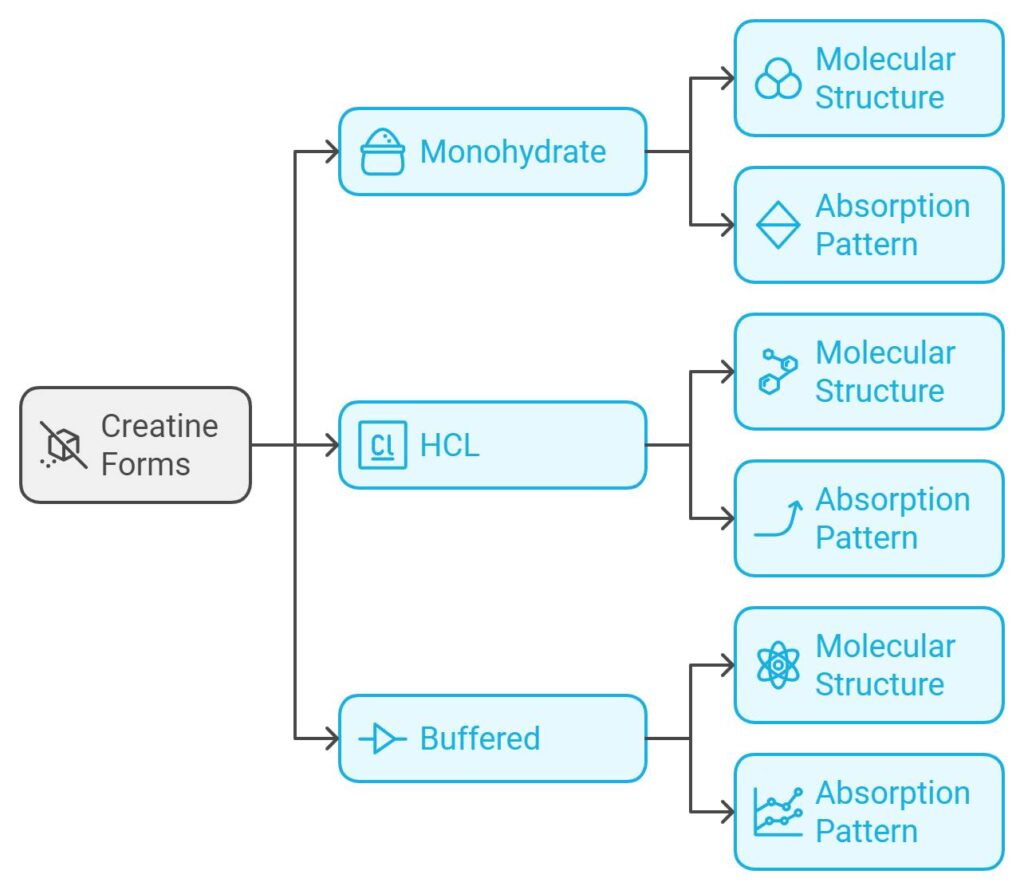
“While various forms of creatine exist, creatine monohydrate remains the most thoroughly studied and proven form, demonstrating consistently superior results in both research and practical application.”
Dr. Eric Trexler, Director of Education at Stronger By Science
Creatine Monohydrate
Can’t talk creatine without giving a big shoutout to Creatine Monohydrate. It’s the old faithful of the fitness world. Why, you ask? Well, ’cause it’s been tried, tested, and proved in gym labs and locker rooms alike.
| Perks | Heads Up |
|---|---|
| Major muscle power boost | Might leave you looking like you swallowed a beach ball (hello, extra water weight!) |
| Loads of scientific thumbs-up | Some folks might feel their stomach doing somersaults |
| Bang for your buck | You gotta load and wait before flexing those muscles |
Creatine Hydrochloride
Then there’s Creatine Hydrochloride (HCl) – it’s your slick and savvy cousin in the creatine family. It blends better and faster, kinda like instant coffee but for muscles.
| Perks | Heads Up |
|---|---|
| Dissolves like sugar in hot tea | Not as much street cred as creatine monohydrate |
| Less chance you’ll feel like a bloated pufferfish | Your wallet might feel the pinch |
| Skip the loading game | Dosing guidelines can be a bit hazy |
Buffered Creatine
Buffered Creatine swoops in to keep your tummy happy. It’s like the bodyguard making sure creatine doesn’t break down too quickly and cause a stomach fuss.
| Perks | Heads Up |
|---|---|
| Keeps stomach grumbles at bay | Tends to be a bit pricier |
| Maintains a steady vibe for absorption | Doesn’t have creatine monohydrate’s track record |
| Stays solid within for longer | Dosing can be a bit of a puzzle |
If you want some more pro tips, take a peek at our rundowns on best pre-workout supplements, how to choose protein powder, and post-workout recovery supplements. Keep that supplement stash well-rounded and tip-top for a killer fitness boost.
Dosage and Timing
Nailing down the right amount and timing for creatine supplements is key to getting the full bang for your buck while dodging any unwanted effects. Let’s dig into the deets on when and how to take this muscle-boosting superhero.
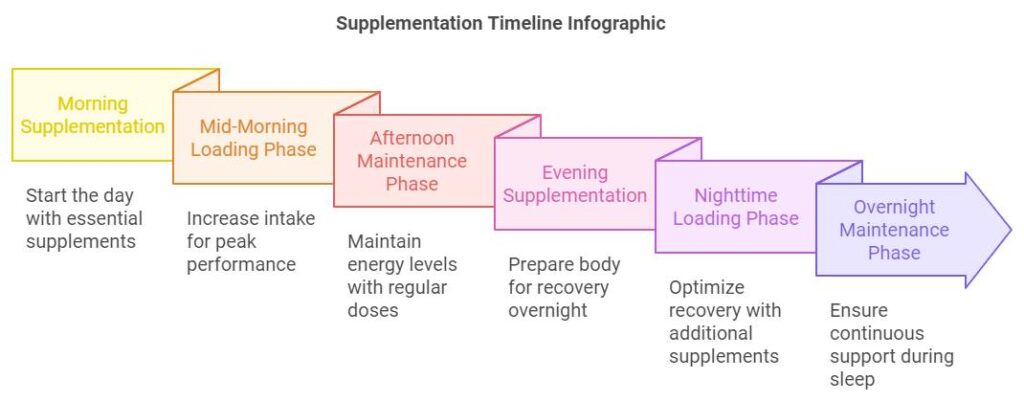
Loading Phase vs. Maintenance Phase
You’ve got two main parts when you’re on creatine: the “loading phase” and the “maintenance phase.” This approach helps pack your muscles with creatine in a jiffy, making the magic happen quicker.
Loading Phase: This kick-off phase goes on for about a week and demands a bigger dose to speed up muscle creatine saturation.
| Phase | For How Long | Dosage per Day |
|---|---|---|
| Loading Phase | 5–7 days | 20 grams (in 4 doses of 5 grams each) |
Maintenance Phase: After juicing up your muscles, a smaller, steady dose keeps things rolling.
| Phase | For How Long | Dosage per Day |
|---|---|---|
| Maintenance Phase | Ongoing | 3-5 grams |
Skipping the loading fun and hopping straight to maintenance? Some folks do just that – the perks might just take a bit longer to show up.
Timing of Creatine Consumption
A timely creatine snack is your secret weapon for top-notch supplementation.
Pre-Workout: Guzzling creatine before hitting the gym can give your performance and energy a nice bump. Throw in a mix with other killer pre-workout formulas for some extra punch.
Post-Workout: Downing creatine after lifting those weights helps with muscle bounce-back and repair, especially if combined with top recovery boosters.
| Timing | What’s in it for You? |
|---|---|
| Pre-Workout | Better power, more zing |
| Post-Workout | Faster recovery, muscle mend |
Daily Routine: If you’re in the maintenance zone, keeping creatine on your daily to-do list, no matter the time you work out, keeps your muscles pumped up.
| Timing | Suggested Amount |
|---|---|
| Daily (Maintenance) | 3-5 grams |
By cracking the code on the right dosing and timing, workout buffs can squeeze the most out of creatine. For extra tips on sports and fitness jams, check out articles on stacking supplements for mega muscle and powerful fat-burning breaks to steer you toward your workout dreams.
Potential Side Effects and Safety
Creatine’s like the lazy genius gym buddy we all need — boosting your muscle mojo and flexing your fitness without you lifting a finger. But hey, even this powerhouse has a few quirks you might wanna know about. Let’s dive into the nitty-gritty.
Common Side Effects
Most folks get along just fine with creatine, but every once in a while, it might cause a little tummy turbulence, especially when you’re just getting started. Here’s what to look out for:
- Digestive Drama: You might find yourself dealing with cramps, nausea, the runs, or just feeling a bit puffy.
- Water Weight: Creatine turns your muscles into water magnets, making you feel a bit heavier. Don’t sweat it, though — it’s all part of the muscle-building master plan to amp up hydration and performance.
| Side Effect | When It Pops Up | Little Extras |
|---|---|---|
| Stomach Cramps | Sometimes | Usually hits with bigger doses |
| Nausea | Sometimes | More common when swallowed |
| Diarrhea | Sometimes | Think: too much, too soon |
| Bloating | Sometimes | Water woes |
| Weight Gain | Often | Water world at play |
If your belly’s barking, try easing up on the dose or splitting it into bite-sized portions throughout your day.
Safety Considerations
Creatine’s generally as safe as a gentle breeze, as long as you stick to the script regarding amounts. But there’s a couple of things to think about:
- Bring on the H2O: Since creatine turns you into a water tank, keep chugging those fluids to avoid getting dried out.
- Kidney Contemplations: Got kidney issues already? Better chat with your doc. Long-term use might get a bit tricky for kidneys.
| Safety Must-Dos | Advice |
|---|---|
| Hydrate | Guzzle good ol’ water all day |
| Kidney Watch | Doctor chats if kidneys are less than peachy |
| Keep an Eye Out | Regular check-ups for any odd health changes |
Always good to get a thumbs-up from your healthcare folks before going all in on a new supplement, especially if you’re already juggling other health stuffs.
Creatine’s pretty much the go-to for gym heroes everywhere, from ripped bodybuilders to marathon monsters. Ready for more tips and tricks in workout supplementation? Peek at our insights on supplement stacking for muscle gain and post-workout recovery supplements. Catch ya there!
Creatine for Different Athletes
Creatine’s got its fair share of fans in various sports scenes. Know how it can give athletes that extra push, and you might find it’s just the ticket to hitting those fitness targets.
Bodybuilders and Strength Athletes
When it comes to bodybuilders and those who pump iron, creatine is the MVP. These folks are all about those quick power moves, and creatine is like the body’s backstage pass to more energy. It boosts adenosine triphosphate (ATP) levels, that magic stuff your muscles call on when you’re lifting heavy or going for that big ol’ explosive rep.
Why Creatine Rocks for These Athletes:
- Lifting Power: Creatine makes you stronger, no doubt about it. It lets you handle heavier weights, opening the door to those majestic muscle mountains.
- Muscle Swell: By helping muscles retain water, creatine gives them that oh-so-good plump look.
- Quick Bounce-Back: Shortens the time to recover between brutal sets, so you can keep pushing hard in your workouts.
| Benefit | Effect |
|---|---|
| Lifting Power | Better performance with heavier weights |
| Muscle Swell | Fuller, more defined muscles |
| Quick Bounce-Back | Speedier recovery between sweat sessions |
For finding the right fuel around your workouts, check out our bits on best pre-workout supplements and post-workout recovery supplements.
Endurance Athletes
Endurance fans like runners and cyclists can be on Team Creatine too, though they’re after a different game. For them, it’s all about keeping the energy trains running longer and better, without running out of steam too soon.
What Creatine Does for Endurance Folks:
- Energy on Tap: Creatine isn’t just for sprints; it helps energy last during those long, grueling events by topping up muscle’s phosphocreatine stores.
- Keep Going Power: Speeds up recovery, letting athletes keep up tough training without burning out.
- Less Drag: Helps fend off tiredness mid-race, so endurance stays strong throughout the event.
| Benefit | Effect |
|---|---|
| Energy on Tap | Boosts phosphocreatine for long efforts |
| Keep Going Power | Faster recovery between tough sessions |
| Less Drag | Less fatigue during endurance events |
For tips on building stamina, check out our posts on endurance supplements and electrolyte supplements to keep your hydration on point.
Grasping how creatine works across the athletic board lets individuals tweak their intake for bigger gains. It’s always wise to pair creatine with a balanced diet and plenty of water to really let it work its magic.
Vegetarian/Vegan Considerations
Vegetarian and vegan athletes might sometimes find themselves scratching their heads over where to snag some creatine and how to weave it into a plant-based lifestyle. Fear not! Performance and progress shouldn’t lose out to dietary preferences.
Plant-Based Creatine Sources
Creatine usually comes from non-animal sources in supplements, but Mother Nature doesn’t hand it out freely to plant lovers—most natural creatine is chillin’ in meat and fish. This means that veggies and vegans have less creatine stored away than their meat-eating pals. No worries though, creatine supplementation is here to save the day.
Table: Creatine Content in Common Foods
| Food Item | Creatine Content (g) per kg |
|---|---|
| Beef | 4.5 |
| Chicken | 3.4 |
| Fish (varies by type) | 3.0 – 10.0 |
| Plant Foods | 0 |
Ya see? Ain’t no creatine in those plant foods. Supplementation’s your golden ticket if you’re looking to amp up those creatine levels.
Incorporating Creatine in Plant-Based Diets
Creatine can be a game changer for vegetarian and vegan go-getters. Creatine monohydrate is a top choice since it usually fits the vegan bill. When checking out creatine stuff, make sure it hasn’t partied with any animals.
Here’s how you can sprinkle that creatine magic into your diet:
- Loading Phase: Blast off by taking higher doses of creatine (20g a day, split into 4 doses) for 5 to 7 days to get those muscles all revved up.
- Maintenance Phase: After the initial burst, tone it down to 3-5g a day to keep those creatine vibes steady.
Table: Recommended Creatine Dosage
| Phase | Dosage | Duration |
|---|---|---|
| Loading Phase | 20g per day (4x5g) | 5-7 days |
| Maintenance Phase | 3-5g per day | Ongoing |
Mix creatine powder with water, your favorite plant-based protein shake, or whatever beverage tickles your fancy. Timing matters too—tossing back creatine after a workout with a carb-loaded meal can make it work even better.
If you’re thinking about throwing other supplements into the mix, check out our guide on supplement stacking for muscle gain.
Bringing creatine into play can help veggie and vegan athletes pump up their strength, performance, and muscle mojo. For more plant-friendly supplement info, take a peek at our vegan sports supplements article.
Conclusion
As we’ve explored, creatine stands out as a versatile and powerful ally in your fitness journey, offering benefits that span from explosive strength gains to enhanced muscle recovery.
Whether you’re a bodybuilder seeking mass, an endurance athlete looking for that extra edge, or a plant-based fitness enthusiast, creatine can be tailored to meet your specific needs.
Remember, success with creatine supplementation comes down to proper dosing, timing, and consistency – while staying mindful of potential side effects and safety considerations. By understanding how to harness creatine’s power effectively, you’re now equipped to make informed decisions about incorporating this proven supplement into your routine. Ready to experience the transformation? Your journey to enhanced performance and results starts with the next scoop!
FAQs
What exactly is creatine and how does it work?
Creatine is a naturally occurring compound that helps produce ATP (energy) in muscle cells. It enhances performance by increasing power output and supporting muscle growth.
Do I need to do a loading phase with creatine?
While not mandatory, a loading phase (20g/day for 5-7 days) can help saturate muscles faster. You can also achieve similar results with a standard dose (3-5g/day) over a longer period.
When is the best time to take creatine?
Creatine can be taken any time, but many prefer taking it post-workout with carbohydrates to enhance absorption. Consistency is more important than timing.
Will creatine make me gain weight?
Initially, you might gain 2-4 pounds due to increased water retention in muscles. This is normal and contributes to the muscle volumizing effect.
Is creatine safe for long-term use?
Yes, research shows creatine is safe for long-term use. It’s one of the most studied supplements with an excellent safety profile when taken as directed.
Additional Resources
Journal of the International Society of Sports Nutrition: Creatine Position Stand https://jissn.biomedcentral.com/articles/10.1186/s12970-017-0173-z
Examine.com: Creatine Research
https://examine.com/supplements/creatine/
Medicine & Science in Sports & Exercise: Creatine Studies
https://journals.lww.com/acsm-msse/pages/default.aspx




